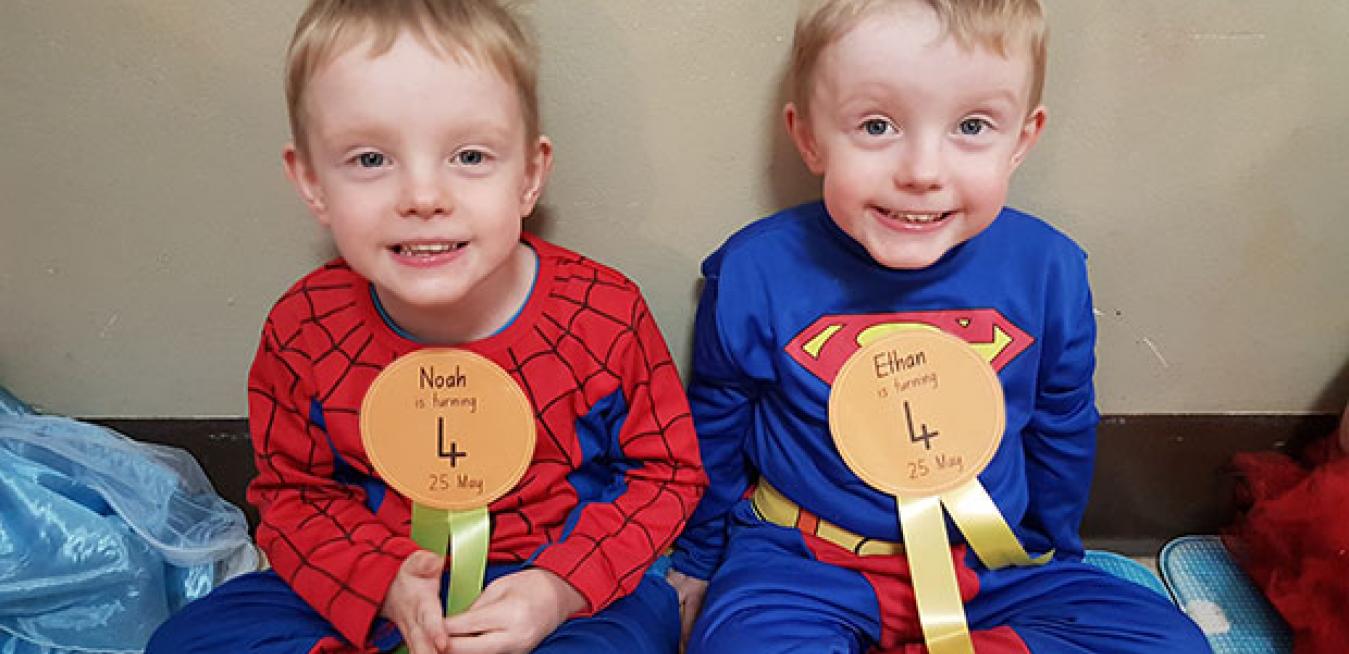Twin brothers Ethan and Noah Caisley are typical mischievous four-year-olds. Just the other day, they came up with a plan for one of them to bust out of their preschool, while the other created a distraction, but the teachers foiled their plot.
The boys and their parents Ben and Emma have triumphed over much more serious complications: Ethan and Noah were born nine weeks premature, each weighing around 1.4kg.
“It definitely feels like a lifetime ago,” says Emma today of her sons’ birth in May 2012, and the many hard months that followed. “We can’t believe everything that went on, and how beautifully they’ve turned out ... normal children, when they faced so many challenges.”
The story of Ethan and Noah’s journey is told in Twin Miracles, a short film made when the twins were two.
November 17 is World Prematurity Day; a time to reflect on the trials that early-arrival babies and their families tackle together, and to be grateful that preterm survival rates are steadily improving, in line with the healthcare technology available to look after these tiny, precious people, who need extra-special care to survive and thrive.
The staggering global statistic is that 15 million babies are born preterm—before 37 weeks of gestation—every year.
The Caisley twins are now delightfully cheeky, healthy four-and-a-half-year-olds. “They keep us on our toes,” says Emma, proudly.
In early 2016, the family moved from Sydney to Singapore, for Ben’s job. They’re in an international preschool three half-days each week, where they’re learning Mandarin. They are already showing their own individual learning styles.
“Ethan seems to be more into the construction and building and how mechanics work,” observes his mother. “Whereas Noah is more into the learning lessons and sitting down and drawing.”
Ethan is “the daredevil, he has no fear and will attack things head on”, she adds, while “Noah is a little bit more cautious, and will assess the consequence.”
Intrepid Ethan is also the twin who had the lion’s share of challenges, born with oesophageal atresia, meaning that his oesophagus wasn’t fully formed. He had surgery to insert a feeding tube when he was just six days old, and more surgeries to lengthen and join his oesophagus, once he’d reached 3kg in weight and his lungs had matured.
Ethan spent the first months of his life at the Grace Centre for Newborn Care at Sydney’s Westmead Hospital for Children, his tiny body cocooned in a GE Giraffe OmniBed, which transported him around the hospital, including to the operating theatre.
Since 2012, the OmniBed—which Ben called Ethan’s “own little world”— seen in Twin Miracles has been made more even parent friendly, with the GE Giraffe OmniBed Carestation launched in 2016.
“When the family looks at a bed like that, it can be a bit overwhelming; the new bed is designed to feel more like a nursery, and less like a hospital,” says Deborah Mayor, Maternal-Infant Care Leader at GE Healthcare Asia Pacific, referring to the suite of animal graphics now available on the patient screen.
“When parents look at the screen, they’re very concerned by all the numbers,” continues Mayor. “One of the numbers that parents like to see is the weight, and on the new screen the weight comes up nice and large. The fact that the baby’s weight is increasing means they are using calories to grow, rather than for stress.”
The gentle graphics for parent-psyche care, every gram of which helps in what Emma Caisley describes as the “hard slog” of having a baby—or babies—in a neonatal intensive care unit (NICU).
As Mayor told GE Reports when the Twin Miracles video was made, the critical medical care provided by the OmniBed Carestation is the constant, controlled environment for the infant.
“Every time you move a tiny premmie baby, you put its life at risk because it can’t control its temperature,” she explained. In the OmniBed, the premature baby “is safely transported from one hospital care area to another without disturbing the baby … resulting in improved thermal and physiological stability, reduced handling and chance of mishap. Less stress for baby and family. One baby, one bed from delivery to discharge.”
Emma and Ben Caisley are now enjoying the adventure of expat life in Singapore, something that was unimaginable four short years ago.
“At the time, you had to put your heads down and power forward,” she recalls. “You couldn’t sit and reflect upon your day … you just had to do the next thing as you went along.”
These days, they rarely see the inside of a hospital. She makes sure Ethan’s food is softer than most, to avoid it lodging in his oesophagus, and he knows to add a water chaser to anything a bit chewy.
“The first couple of years were hard with all of the different specialists. While illness is not quite a thing of the past, it’s much more about the sicknesses that every child gets. If you just look at how far the boys have come, it is amazing.”
Read Emma Caisley’s hard-won pointers for parents whose babies are spending their first weeks, or months, in special care.





